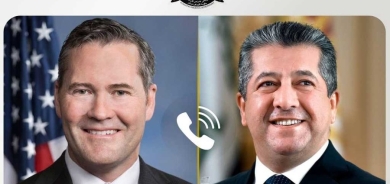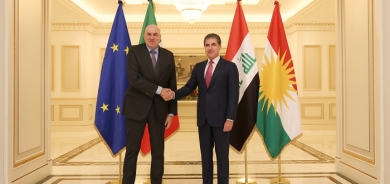Interview with Professor Michael M. Gunter - Tennessee Technological University, USA
June 1, 2010
Exclusive Interviews

Once again, the Iraqis had failed to agree about the 3 sovereign positions, which include; the Prime Ministers’ office, the President of the Republic’s Position, and the Speaker of the Parliament’s Chair, and the issues been delayed for the next Two Weeks. I do believe that all these things lead to the bitter fact that the Iraqis can not reach to an agreement within themselves, and the question is; if the Iraqis can not agree, so how can they form the new Iraqi Government?
- It is true that the Iraqis have been unable to reach an agreement on forming their new government and this is a destabilizing situation that if prolonged could threaten the very existence of the unified federal democratic Iraqi state, which is what the Kurds want. However, we have not reached a desperate hopeless situation yet. Bargaining continues and I expect that eventually an agreement will be reached. However, clearly Iraq’s friends and supporters headed by the United States should use what influence they have, both overtly and otherwise to nudge the political process of forming a new government forward to success. We shall see!
Many observers think that the coming of Vice President Mr. Biden to Iraq was to push the Iraqi parties forward and to make them overcome this catastrophic situation. But as it appeared; Mr. Biden’s efforts were useless in solving this issue. And the question is; don’t you think that this mean that the U.S. today does not have the same role and influence it had in the past in Iraq?
- Clearly, one of U.S. Vice President Joseph Biden’s main reasons for visiting Iraq was to encourage and push the various contending Iraqi factions towards reaching an agreement on forming the new government. Also clearly Biden failed to achieve an immediate breakthrough. However, we might see in the next couple of weeks some delayed success from the Biden visit because, although it is true that Iraq is now a sovereign state, U.S. influence still remains strong. Not as strong as earlier, but that is what the U.S. ultimately wants: A sovereign liberal-democratic, pro-Western Iraqi state that can make its own decisions as a viable state. To the extent that all this is and has occurred of course the U.S. influence is no longer as strong as it has been in the past. There is nothing unusual about this.
According to many observers, when the political process in Iraq reach to a block road and the Iraqis end up with disagreement, they think that the international Community should interfere and support the Iraqis in order to make them overcome this critical situation. And the question is; according to your opinion, how far do you think that the International Community, especially the U.N. and the European Union are expected to support the Iraqis regarding to this matter?
- Frankly, I do not think the U.N. or the European Union consider helping Iraq form a new government is an important issue for them. Indeed, Iraq’s instability on such issues as this plays into the hands of its potential regional rivals such as Iran and Syria. Undoubtedly, the inability to form a new government facilitates extremist elements involved in the Iraqi equation. It is necessary therefore that all those committed to the idea of a unified liberal-democratic federal Iraqi state step forward, compromise (which is the crux of politics), and form a government. If this new government does not work, then the democratic solution is to form a new government, either through new bargaining among the parties or new elections. Frankly, given the current electoral impasse, new national parliamentary elections may be necessary. If a new government cannot be formed in the near future, new elections will be necessary to break the impasse!
Now a day; the talks are about the current Iraqi Government of being a Caretaker Government, more than to be a legitimate one. And besides of taking care of the daily works, the Iraqi Government can not issue any decision. Whilst Dr. Al-Maliky, the outgoing Iraqi Prime Ministers is emphasizing that the Iraqi Government still have the same jurisdictions as before and still is entitled in the implantation of the laws and even make decisions. The question is; don’t you think that this is a violation of the Iraqi Constitution?
- Until there is a new government it is the constitutional duty of the current old government to continue to run the country. Of course, the current impasse is not normal for any successful democracy. The longer there is no new government the worse this situation will probably become. However, remember the alternative to not having at least the Al-Maliki caretaker government is anarchy, which would lead to bloodshed and then possibly a dictator, none of which would be in the interest of the Kurds.
Both political lists; “The State of Law” and “The Iraqi National Alliance (The INA)” had agreed together to exclude Dr. Alawy the head of “The Iraqiyah List” from undertaking the Prime Ministers’ Office. But we see that both of the lists are disagree about determining “Who would become the next Prime Ministers”. According to your opinion, don’t you think that this situation may increase Dr. Alawy’s chances to claim for the Prime Ministers’ Post again?
- Yes, the inability of the two lists who have agreed to exclude Alawy not to be able to agree on a new prime minister helps Alawy’s cause. However, Alawy’s problem remains that he needs coalitional partners to from a majority. So the problem of an electoral impasse remains.
In the midst of this crisis, what role does the Kurds can play? Do you think that the Kurds can play a decisive role regarding to the Sovereign Positions in the Iraqi Political Process?
- The Kurds continue to play an important role, but clearly not a decisive one as no solution to the problem of no new government has emerged. As the attempt to create a new government continues, the Kurdish role could either become decisive or insignificant depending on developments. Clearly it is in the interest of the Kurds to continue to keep playing an important role as otherwise the Kurds will be at the mercy of a new potentially anti-Kurdish government.
Many observers believe that Dr. Al-Maliky is not ready to leave the Prime Ministers’ Office peacefully, and that’s considering as a threat upon the political process. And the question is; if Dr. Al-Maliky refuses to leave the Prime Ministers’ Office peacefully, don’t you think that the Democratic Process in Iraq may be endangered?
- I think Al-Maliki would be willing to leave office peacefully if and when a new government is constitutionally chosen. However, until that occurs it is his constitutional duty to remain in power as a caretaker government.
Last Question: in your personal view; how do you read the Iraqi Political Process, and are you optimistic enough that the Iraqis will be able to agree about the Sovereign Positions peacefully?
- I am disappointed but not completely surprised at the current governmental impasse. Nevertheless, there is still a reasonably good chance that the different parties will be able eventually to form a new government. If not, then Iraq will either be on the road to disintegration or being taken over by a dictator. Either occurrence would not be in the Kurdish interest, which is a federal democratic Iraq that would then be accepted by its neighbors. At the present time at least an independent KRG would not be in the Kurdish interest as it would create great problems with Turkey and Iran both of whom are necessary for a bright Kurdish future. And both accept a federal unified Iraq, which allows the Kurds in practice most of what they would achieve with independence but without the terrible problems independence would bring.















